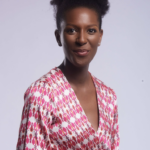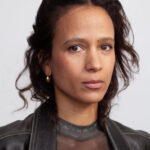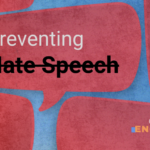I stood in the packed, sweltering ballroom of the East Garden mansion, digging my toes into thick peach carpet, trying to steady myself and not pass out. It was 2 a.m. Church leaders had wedged me into a tight row of other young women, whom I called sisters, for hours, waiting.
Everything inside begged me to run, sneak past security dotted along the 18-acre compound, and follow the Hudson River north 70 miles to get home. But my training, which had taught me to be silent and obey, was winning.
Reverend Moon, an elderly Korean man in a sharp business suit, stood on a stage at the front of the ballroom and pointed. First to a brother, then a sister. That meant that they were Matched. Engaged.
My parents raised me calling this man “True Father,” believing he was the Messiah. He had picked my parents for each other. I’d always expected he would do the same for me. This was an event my parents and religious community had prepared me for my whole life. But at that moment, everything about it seemed wrong.
When Moon pointed to me, it felt like a thousand people turned to stare. My mouth went dry, and I couldn’t remember how to breathe. I knew if I tried to scream, no sound would come out. My gaze darted around the room, looking for an escape, for someone to offer me an alternative to what was about to happen. The onlookers no longer seemed to be my brothers and sisters, but hollow husks of humans mindlessly waiting for their next command. Did I look the same to them, as I shook in my socked feet, waiting for Moon to pronounce my fate?
Finally, I dared to look up and into his eyes. It was an act of deep disrespect ― the only rebellion I could muster. I wanted to see him looking back at me, to assess his worth as deeply as I thought he might be analyzing mine. But when I dragged my gaze to his face, his disinterested expression said he barely saw me. Was I simply another husk to him?
Then his finger jabbed in several directions. A young woman and two men stepped forward, and I didn’t know which of the men Moon had assigned me to. One gestured to me. But before I could turn to him, darkness swam across my vision, the words “game over” ringing in my ears.
When I tell people I left an arranged marriage that I felt I was forced into, most struggle to believe that can happen in the United States. Although there was no shotgun at my wedding in 2004, there were unseen coercive forces that were nearly as persuasive. The ceremony wasn’t even legally binding ― I would have had to apply for a marriage license and work out visas after the Blessing. I fought hard against taking those steps, knowing that l had neither the finances nor legal expertise to extricate myself from a marriage contract. Besides, the religious constructs around the Blessing felt more ironclad to me at the time than any paper from the state.
I was born and raised in the Unification Church, a religious group that some have accused of being a cult. Most people remember them as the Moonies. The group came to the attention of the public in the 1970s and ’80s with accusations of brainwashing and controversial recruiting techniques ― allegations the church has refuted. Moon had matched my parents in the ballroom of the New Yorker Hotel in 1979, and they then participated in a mass wedding, a “Blessing” ceremony, at Madison Square Garden in 1982.

Those of us born into the church were “Blessed Children.” Our parents believed we were the first people since Adam and Eve without original sin. I was taught that my purpose was to grow to perfection, take part in a Matching and Blessing ceremony, and ultimately have Blessed Children of my own.
Because Moon picked our spouses, dating was not encouraged. I was raised to call other members “brothers” and “sisters” in order to emphasize the importance of pure relationships before marriage. Many members believed that Moon had won significant spiritual battles against Satan, and therefore the way for us to be similarly victorious against Satan was to follow Moon’s example and teachings.
The problem was that I was always questioning. My faith was shaky and, as a reflex, I was ashamed and hated myself. By 19, this had led me to a terrifying personal precipice ― considering leaving the Unification Church. But with no means of supporting myself and no safety net outside of the insular church community, the fear of the outside world paralyzed me.
Before I could make a decision about abandoning the faith of my childhood, there was news. After five years of having parents match their children, Moon was, at 82, stepping up again, and was going to conduct a Matching ceremony himself for the second generation ― perhaps for the last time before he died.
My parents sat me down in their bedroom and listed all of the reasons why I should go. The summer before Moon began Matching again, I’d rejected a Match my parents had tried to broker when they’d gotten wind of my struggles. If I failed to find a good Match, it would be more difficult for my four younger siblings. Plus my dad worked for one of Moon’s sons. I worried that if I said no, our family could be considered unfaithful and Dad might lose his job. And though it was unspoken, we all knew that at barely 20 years old, my eligibility expiration date was staring me hard in the face.
My mother finished our conversation with, “If Jesus came to you and said that he had found your perfect spouse, what would you say to him?” She paused for effect. “Now, how much more is Father?”
I couldn’t think of a coherent response. To refuse was to deny the remotest possibility that Moon might be who he said that he was. I simply had not gotten there in my journey. Then, as though from a great distance, I heard myself mumble, “OK.”
Mom’s face lit up. The tension went out of Dad’s body too.
“Don’t worry. It’s just a Matching,” Mom said, leaning across the bed to hug me. “You’ll have time to get to know each other before getting Blessed.”
“When other young women began arriving with wedding dresses, I realized that this wasn’t just a Matching, there was going to be a Blessing ceremony as well. There would be no time to get to know my future spouse, and likely no separation period either. The thought of the sexual expectations I might suddenly encounter chilled me.”
She had a valid point. One never knew when the next Blessing ceremony would be. Often couples had to wait several years before Moon decided it was a spiritually significant enough time to hold a Blessing. I had been taught there was a three-year separation period (during which time the couple had to live apart from each other) for first-generation members, although this was not necessarily a requirement at all Blessings for the second generation. Still, when my mom said that we would have time to get to know one another, I assumed she meant there would be time before a Blessing was held and a three-year separation too.
The next morning she drove me to East Garden, one of the Westchester properties owned by the church. At 5 a.m., we pulled up to the iron gates guarding the estate. After security cleared us and we passed the mansion, Mom dropped me off in front of a long conference center built into a rocky outcropping. Terraces wrapped around each level ― one ended in a tower that looked like it belonged on a prison.
For the next several hours, a few other early arrivals and I sat on the floor of the marble ballroom while a rotating cast of leaders lectured us on our profound unworthiness to receive the Matching. But when other young women began arriving with wedding dresses, I realized that this wasn’t just a Matching; there was going to be a Blessing ceremony as well. There would be no time to get to know my future spouse, and likely no separation period either. The thought of the sexual expectations I might suddenly encounter chilled me.
Hot, angry tears streamed down my face as I approached anyone, even strangers, to borrow a cell phone to call home. When I begged my mom to pick me up, she said, “Jennie, this has always been your choice.” But in those words I heard both a threat and a refusal.
And this is the part that so many struggle to understand. If I had said, “I choose to come home,” my mom likely would have driven down to pick me up, no matter the hour. But I was afraid. The weight of a lifetime’s worth of indoctrination crushed me into compliance, believing that I would lose everything I held dear if I walked away. Sociologist Dr. Janja Lalich might have identified this as an instance of “bounded choice,” or the illusion of choice created by a high-demand environment.

By the end of the day, Blessed Children from all over the world packed the ballroom to capacity. I struggled for air in the humidity of the collective breath that gathered during the hours of lectures. When Moon finally took the red-carpeted stage to address us, I couldn’t tell if it was late evening or early morning.
“Do you want me to Match you tonight?” he’d shouted to the room in Korean as another leader translated. Panic ignited a ball of heat in my core.
A thunderous “yes” echoed around me. I couldn’t answer for fear I might throw up. Spots appeared in my vision. I tried to quiet my mind with the mantra that Moon had taught us.
Absolute Faith. Absolute Love. Absolute Obedience.
The following hours were a blur , as I alternated between sadness and terror. When the ceremony was over, I borrowed another cell phone to call home. My mother’s sleepy voice answered.
“I’m Matched,” I said, without emotion. “To a Norwegian.” Then I hung up.
Three days later, I stood next to a tall stranger at the back of that crowded ballroom while wearing a wedding dress several sizes too big. I’d felt discouraged from going home, even for Christmas the day before. I was raised to believe if I left, it meant I could be setting a condition for the evil spirit world to prevent me from claiming victory for God by attending the Blessing. Instead, I stayed in the ballroom where I slept, ate and listened to lectures with the other members. My mom got special permission to pick me up to hastily purchase a dress.
Despite a foggy numbness that had overtaken me, during the Blessing my personal truth crystalized: I didn’t believe Moon was the Messiah. Yet there I was, repeating vows in a language I didn’t understand, pledging myself to a stranger. It was then I finally knew I had to get out. No matter how kind or good a person this man might be, I could not build a marriage or a life with someone based on something I didn’t believe in.
I signed the equivalent of church divorce papers the day before I turned 22. It was my birthday gift to myself. It had taken me two years of fighting to get the paperwork that would “break the Blessing.” All prior attempts at ending the relationship had been disregarded. My spouse and his family had hounded me with calls, emails, and visits trying to make it work. My parents begged, and cajoled ― at times my struggle threatened to break our relationship. I’m sure that in their minds they were all trying to save me from Satan’s clutches and the devastating sin of ending the marriage.
But the gift was bittersweet. In breaking my Blessing, I lost my identity as a Blessed Child and had to rebuild it and community from a kind of ground zero. Still, I was one of the lucky ones. Though my parents were devastated and angry after I left the church, and we went through periods of estrangement, we worked to maintain a relationship. Too many others like me were shunned by their families, who could not accept children who didn’t share their beliefs.

Moon died in 2012, leaving behind a vast religious and business empire. Since then there has been a schism. Moon’s widow runs the main branch of the church, while two sons head splinter groups. The fault lines have split some families, and caused crises of faith for others. Many members have also broken their Blessings, so there is less stigma now. While some are choosing to be re-Blessed, a number are leaving the church behind. My parents chose to stay both married and in the church.
For some, these ruptures were cause for reflection and reform. I’ve heard in the main branch of the church second-generation members are helping to select their spouses. Some are getting Blessed to non-members. But even still, I wouldn’t go back.
For me, leaving wasn’t the hardest part. What was harder, by far, was standing in the wreckage of my identity and sifting through the remains to see if there was anything left worth salvaging. If I was no longer a Blessed Child, then who was I, and where did my value come from? There are no easy answers, and no guarantee that time can heal those wounds.
Eventually I built a happy life for myself ― something I had been taught was not possible on the outside. Moon had warned that those who left would die in tragic accidents, be struck by lightning or get cancer [Note: A Unification Church representative told HuffPost, “Rev. Moon offered many allegories in his lifetime that members have understood are not literal.”] Sadly, my mom was diagnosed with stage 4 breast cancer weeks before I broke my Blessing. Because of that teaching, accusations lay thick but unspoken between us that I might be the cause.
I helped care for her during treatment. But as soon as it finished, I scraped together $900, bought a rusty old Saab 900, and rented a room near the local college to take classes. I learned photography and got a newspaper job to pay my way through school. Still, I was only minutes from my family. It was important to me to be there for them, especially if my siblings left the church ― which they did eventually.
As I built my new life, I kept my background a secret out of fear and shame. I didn’t have the capacity to understand my experience, or express it verbally. But I began turning the camera on myself to process my past. Over the years, I developed a series of self-portraits called “Burdens of a White Dress.” It explores growing up in a high-demand group, as well as the intersections of purity culture, coercive control and the sexual, mental and emotional traumas that occur as a result.
Creating the project extracted something malignant from within, enabling an incredible sense of healing. I was able to release much of my fear and shame. The more honest I was about my past and wounds, the more I could bond with others. And that kinship taught me I wasn’t alone, that even if someone didn’t share my background, my pain wasn’t unique. Although I’m always saddened to hear others have suffered similarly, that connection l helped me transcend my pain.

Today I am happily married and recently welcomed a daughter into the world. The transformative experience of new motherhood ― both its delights and its struggles ― have shifted the lens through which I view my past. My mother passed away seven years ago. Her last words to me from her sickbed were, “maybe I should have just let you kids be who you were.” I’d stiffened, too full of grief and anger to offer any response beyond a nod. But today, I want to honor her last words as the North Star for how I raise my own child. What a beautiful gift it will be to watch and support her in the journey of self discovery. And, I suspect there will be healing for me in that as well.
There is no single story that can encompass the spectrum of experience of growing up in the Unification Church. However, as I’ve connected with others who have left, I’ve found that there are similar undercurrents of pain we all carry. Many of us felt disconnected from our true selves growing up, coerced into performative identities to stay safe and keep the love of our parents and community, which often felt conditional.
I am no longer religious. I’ve found there are too many other faiths that leave a trail of wounded in their wake, the shape of those wounds achingly familiar. In some ways it feels easier to have grown up in a group that has grappled with the “cult” label for so many years. There is a binary of in-group and outside world that I can label “bad” and “good.” But to do so is reductive and misses the larger picture.
One does not have to be raised as I was to experience coercive control, which is “defined as a pattern of behaviors that enables someone to exert power over another person through fear and control.” The dynamics I experienced in the Unification Church are present in many other churches, political groups, workplaces and relationships. With the 2015 Serious Crime Act, the U.K. has begun to legislate against coercive control within intimate relationships, but there are no such federal laws within the U.S., and not all state bills offer equal protections or any protections outside of the domestic sphere.
Part of the issue is that many lawmakers don’t understand coercive control, so legislators sponsoring these bills can face uphill battles as a result. But the more we bring stories like mine into the public forum, the more we can shed light on problem areas, discuss solutions and provide services for those who need healing.






